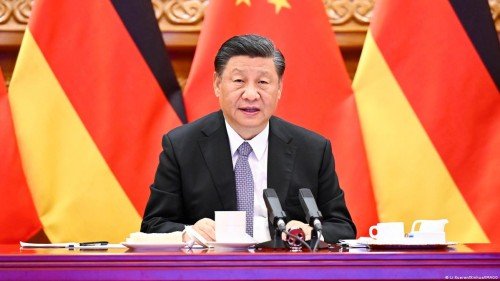
China and Germany have a long history of diplomatic relations that dates back to the 1860s. Today, these two countries maintain a strong economic and political partnership that has benefited both sides. In this blog post, we will explore the nature of the Chinese relationship with Germany and the factors that have contributed to its success.
Economic Ties:
One of the most significant factors in the Chinese-German relationship is their economic partnership. Germany is China's largest trading partner in the European Union, while China is Germany's most significant trading partner worldwide. In 2020, the bilateral trade volume between China and Germany reached over 212 billion euros. This economic partnership has contributed to the growth of both countries' economies and has facilitated technological exchanges, making Germany a significant player in China's ambitious Belt and Road Initiative.
The economic ties between China and Germany have played a significant role in the strength of their relationship. Germany is China's largest trading partner in the European Union, while China is Germany's most significant trading partner worldwide. In recent years, the two countries have continued to deepen their economic partnership through increased investment and trade. For example, in 2020, German exports to China totaled over 96 billion euros, while Chinese exports to Germany were over 116 billion euros.
One of the key areas of cooperation between China and Germany has been in the field of technology. Germany is known for its advanced manufacturing capabilities, while China is rapidly becoming a global leader in areas such as artificial intelligence and 5G networks. By working together, both countries can benefit from each other's expertise and strengthen their technological capabilities.
Another area of economic cooperation between China and Germany has been in infrastructure development. Germany has been an important partner in China's ambitious Belt and Road Initiative, which aims to build new trade routes and infrastructure across Asia, Europe, and Africa. Through this partnership, German companies have been involved in a range of infrastructure projects in China, including the construction of high-speed railways and ports.
Despite the strong economic ties between China and Germany, there have been concerns about the impact of this relationship on other countries. Some critics argue that China's growing economic influence in Europe, including in Germany, could lead to increased political influence and pressure on other countries to align with China's interests. As a result, there have been calls for greater scrutiny of Chinese investments in Europe and for greater coordination among European countries to ensure a level playing field for all investors.
Cultural and Educational Exchanges:
Another key factor in the Chinese-German relationship is their cultural and educational exchanges. Many Chinese students choose Germany as their destination for higher education, while many Germans also travel to China for cultural and educational purposes. This exchange of ideas and cultural experiences has contributed to a better understanding of each other's culture, promoting goodwill between the two countries.
Cultural and educational exchanges between China and Germany have been another important aspect of their relationship. Many Chinese students choose Germany as their destination for higher education, and in recent years, there has been a significant increase in the number of Chinese students studying in Germany. According to the German Academic Exchange Service (DAAD), in the academic year 2019/2020, there were over 40,000 Chinese students studying in Germany.
Similarly, many Germans are also interested in learning about Chinese culture and language. The Confucius Institute, a non-profit organization dedicated to promoting Chinese language and culture, has a presence in many German universities and cultural institutions. The institute offers language courses, cultural activities, and exchanges with Chinese institutions.
In addition to these educational exchanges, cultural exchanges between China and Germany have also been thriving. Many cultural events and exhibitions featuring Chinese art, music, and literature have been held in Germany, while German cultural events are also held in China. These exchanges promote mutual understanding and respect between the two countries and contribute to the development of their cultural relations.
One of the most significant examples of cultural exchange between China and Germany is the Frankfurt Book Fair, which is the largest book fair in the world. The fair has been an important platform for promoting Chinese literature and culture in Germany and other countries. The Chinese Pavilion, which is a dedicated area at the fair, showcases Chinese books, authors, and publishers, providing a platform for Chinese writers to connect with a global audience.
Overall, cultural and educational exchanges between China and Germany have helped to deepen the understanding and friendship between the two countries. They have also contributed to the development of their respective cultures and fostered cooperation in areas such as science, technology, and innovation.
Political Relations:
Germany has been a long-standing supporter of China's One China Policy and has not officially recognized Taiwan as an independent state. This stance has been important to China, and it has contributed to the strength of their political relations. Furthermore, Germany has been vocal about its support for China's integration into the global economy, advocating for China's membership in the World Trade Organization in 2001.
Political relations between China and Germany have been generally positive, with both countries recognizing the importance of their partnership for global stability and economic growth. Germany has been a long-standing supporter of China's One China Policy, which recognizes that there is only one China and that Taiwan is a part of it. Germany has not officially recognized Taiwan as an independent state, which has been important to China and has contributed to the strength of their political relations.
Germany has also been supportive of China's integration into the global economy. In 2001, Germany advocated for China's membership in the World Trade Organization (WTO), which has helped to facilitate greater trade and investment between China and the rest of the world.
However, there have been concerns about the impact of China's rising economic and political power on the world order, particularly in light of China's assertiveness in the South China Sea and its increasing involvement in Africa. Germany has expressed concerns about these issues and has called for greater transparency and cooperation from China to ensure that its actions are consistent with international norms and standards.
In recent years, there have also been concerns about China's human rights record, particularly in relation to its treatment of ethnic and religious minorities, such as the Uighur Muslims in Xinjiang province. Germany has been critical of China's human rights record and has called on China to respect human rights and freedom of expression.
Overall, while political relations between China and Germany have been generally positive, there have been challenges and concerns that need to be addressed. It will be important for both countries to continue to engage in dialogue and cooperation to ensure that their partnership remains mutually beneficial and contributes to global peace and prosperity.
Challenges:
Despite the strong partnership between China and Germany, there have been challenges in their relationship. One of the most significant challenges is the issue of human rights. Germany has been critical of China's human rights record, particularly regarding its treatment of Uighur Muslims in Xinjiang province. Additionally, Germany has expressed concerns about China's increasing assertiveness in the South China Sea and its involvement in Africa.
Despite the positive aspects of their relationship, China and Germany face several challenges that could potentially strain their partnership.
One of the biggest challenges is the issue of human rights. As mentioned earlier, Germany has been critical of China's human rights record, particularly in relation to the treatment of ethnic and religious minorities. This has led to tensions between the two countries, and Germany has been vocal about its concerns, calling for greater transparency and cooperation from China to address these issues.
Another challenge is the issue of trade and economic competition. While China and Germany have a strong economic partnership, there have been concerns about China's trade practices, including allegations of intellectual property theft, forced technology transfer, and unfair competition. This has led to tensions between the two countries, with Germany calling for greater transparency and fair trade practices from China.
The issue of climate change is another challenge facing China and Germany. Both countries are significant emitters of greenhouse gases, and there is a growing consensus that urgent action is needed to address the threat of climate change. While both countries have made commitments to reduce their carbon emissions, there have been concerns about whether these commitments are sufficient to meet the goals of the Paris Agreement. Germany has been calling for greater action from China and other countries to address the issue of climate change.
Finally, there is the issue of geopolitical tensions, particularly between China and the United States. As a key ally of the United States, Germany's relationship with China is closely watched, and there are concerns that tensions between China and the United States could spill over and affect the relationship between China and Germany. This could have significant implications for global stability and economic growth.
Overall, while the relationship between China and Germany is strong, there are several challenges that need to be addressed. It will be important for both countries to engage in open and honest dialogue to address these challenges and ensure that their partnership remains strong and mutually beneficial.
Conclusion:
Overall, the Chinese relationship with Germany is a crucial one that has benefited both countries in various ways. Despite the challenges, the economic, cultural, and political partnerships between the two countries have remained strong. With the ongoing COVID-19 pandemic and the changing geopolitical landscape, it will be interesting to see how this relationship evolves in the years to come.








